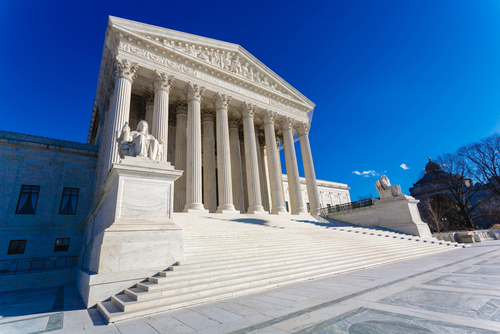The organization urged the Supreme Court to uphold the consideration of race as one, inseparable factor of college applications–to the benefit of all students and society at large.
WASHINGTON–Today, David Hinojosa, Director of the Educational Opportunities Project at the Lawyers’ Committee for Civil Rights Under Law, argued in front of the Supreme Court of the United States to defend race-conscious admissions in Students for Fair Admissions vs. University of North Carolina (UNC). This case, alongside the companion case, Students for Fair Admissions vs. President and Fellows of Harvard College, threatens to reverse more than 45 years of established legal precedent and progress toward making higher education more equitable and accessible to Black and Brown students.
Hinojosa emphasized that affirmative action benefits our entire society, as racially diverse campuses expose students to a wider breadth of perspectives, and equip them with the tools they need to navigate and lead in our global society.
“From the Sweatt and Brown cases through Bakke and Grutter, this court has recognized the paramount roles that integrated education and cross-racial interactions play in building a true democracy, where pathways to leadership are visibly open to all qualified candidates,” said David Hinojosa. “We have made progress, but many colleges are not there yet–including UNC, which grapples with over 160 years of exclusion and its present-day effects.”
When questioned about whether race-conscious admissions harm anyone else in the admissions system by advantaging underrepresented minorities, Hinojosa responded “Evidence shows that hundreds of white students with lower combined GPAs and SAT scores were admitted ahead of higher performing Black students and Latinx students who went to UNC, and I think that bears the hallmark of this type of individualized consideration that this court wanted.”
Outside the Supreme Court, students, alumni, and advocates across racial backgrounds rallied in support of race-conscious admissions, emphasizing the devastating consequences that rolling back affirmative action would have. The Lawyers’ Committee has represented a racially and ethnically diverse group of students and alumni at both UNC and Harvard since the beginning of each case several years ago. These students, their allies, and alumni continue to organize on their campuses and beyond to keep open the doors of opportunity.
“We can’t let campuses, which are often the instigator for activism in racial justice movements nationwide, misrepresent the racial makeup of our nation when they should reflect and celebrate our diversity. We can’t let students, the future of our country, be silenced when speaking about their identity — they should be empowered to embrace it,” said Andrew Brennen, UNC Class of 2019, who testified in support of affirmative action at the lower court. “We often credit education as a critical step for future success and we must ensure it remains this way for all of us.”
Despite widespread public support for affirmative action, as evidenced by recent polling showing 87% of respondents believe all students, no matter their race, benefit from college campuses that reflect the diversity of America, critics of race-conscious admissions policies wrongfully attack the hallmark practice as a zero-sum game. This claim ignores the fact that admitted applicants of color are comprehensively talented.
“We are at a critical moment in American history, where we must choose whether to expand or limit educational opportunity–a cornerstone of a functioning democracy–for those who have been historically excluded from it,” said Damon Hewitt, President and Executive Director of the Lawyers’ Committee. “The record in these cases is clear and strong, and the law is well-settled. The question is not whether race matters. We already know that it does because race is an inextricable component of our identity and impacts our daily lives. The question now is whether the Supreme Court will acknowledge it.”
###
About the Lawyers’ Committee for Civil Rights Under Law – The Lawyers’ Committee for Civil Rights Under Law is a nonpartisan, nonprofit organization, formed in 1963 at the request of President John F. Kennedy to mobilize the nation’s leading lawyers as agents for change in the Civil Rights Movement. Today, the Lawyers’ Committee uses legal advocacy to achieve racial justice, fighting inside and outside the courts to ensure that Black people and other people of color have the voice, opportunity, and power to make the promises of our democracy real. For more information, please visit https://lawyerscommittee.org.


